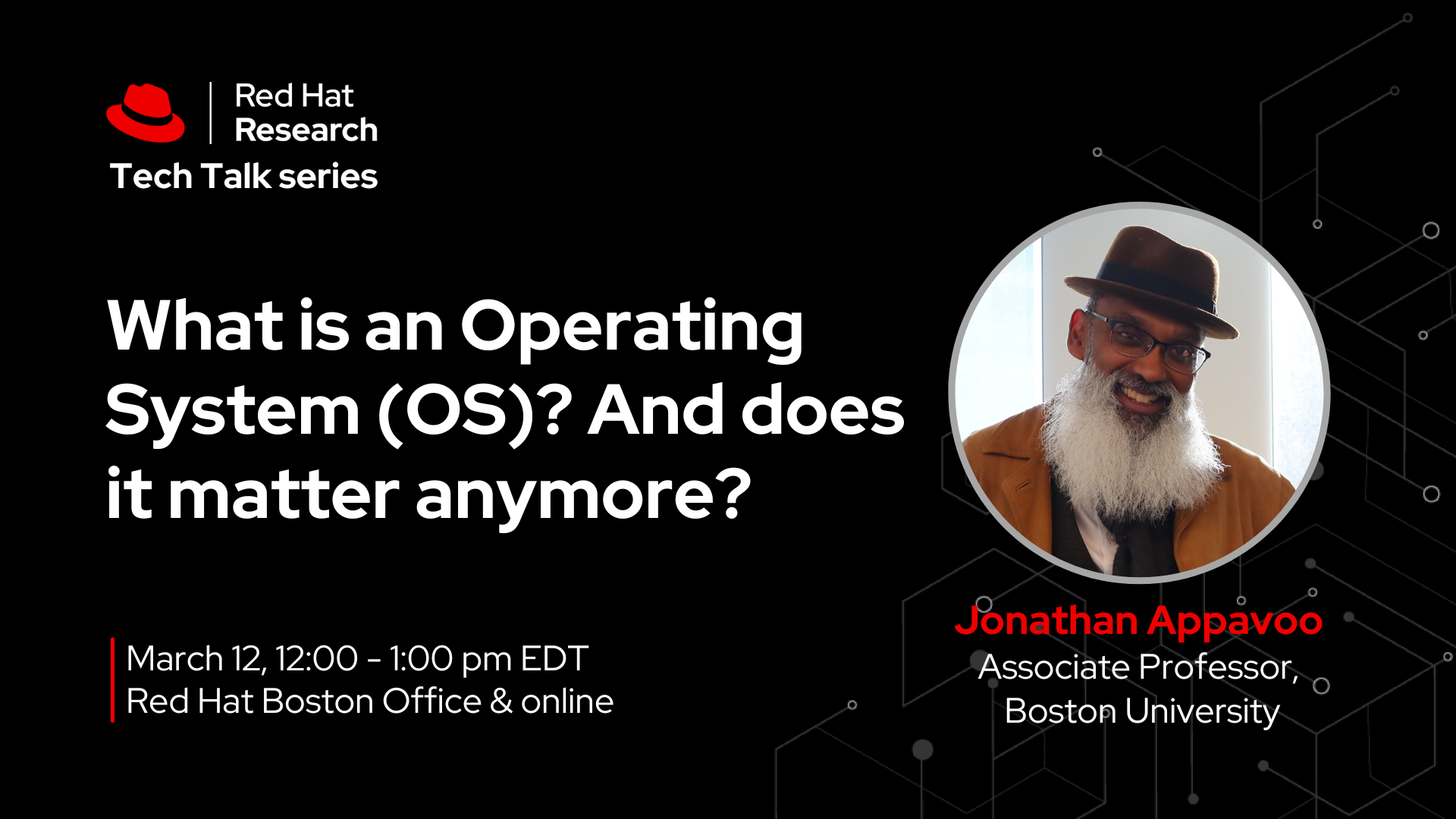
Red Hat Research Tech Talk: What is an Operating System (OS)? And does it matter anymore? with Jonathan Appavoo, Associate Professor, Boston University
What is an Operating System (OS)? And does it matter anymore?
Subtitle: Life, the universe, and everything — one OS Researcher/Geek’s perspective.
Sub-subtitle: Confessions/Ramblings of an unrepentant kernel hacker
Abstract
Who are we? Where are we going? These are the questions that face us, as OS professionals and Researchers, at every turn in the destiny of computing. Are we relevant anymore? Do we serve a purpose? Have we reached the end of the “glory” days? Has AI also made us obsolete too? Was open source the death of OS innovation? The rebirth of OS innovation? Are we just glorified firmware developers now? Is the Cloud the next golden Age of Operating System Innovation or the final nail in the coffin?
In this talk, I will probe the above questions by discussing the research projects I have participated in over the last 20 years, including our current work in the Red Hat Collaboratory. These projects explore specific conjectures on how computer systems and their usage might evolve and the role and nature of the operating system. These include the following conjectures:
- Scalable “large” 64-bit multiprocessor hardware would be commonplace.
- Supporting elasticity in OS data structures is a foundation for multiprocessor OS scalability.
- Data-center scale systems would usher in a new dimension in elasticity.
- Extreme scale and elasticity in hardware can permit a redefinition of the OS.
- Simplified kernels can have significant advantages.
- Hybrid OS designs combining general-purpose and special-purpose kernels can enable an accelerator computing model.
- “Operating Systems” can fundamentally help dynamically optimize applications, not just passively run them.
- A “computational caching” model can enable a new era of systems where redundancy in execution can be discovered and exploited.
While we may be unable to answer the opening questions, I hope to convince you we, as OS experts, do “live in interesting times.”
Bio
Jonathan Appavoo, PhD is an Associate Professor at Boston University in the department of Computer Science. Prior to that he was a Research Staff Member at IBM’s T.J. Watson Research Center in New York. Professor Appavoo loves to hack on computers and dream about future systems and has surprisingly found a way to make a living at it. As a graduate student at the University of Toronto (UofT) he began his PhD working in Computer Vision hoping to build robots. He quickly realized the error of his ways and switched to working on the Tornado operating systems – a novel multiprocessor OS for an ambitious large scale NUMA multiprocess being designed and built at UofT. He followed Tornado’s journey to IBM and worked on IBM’s K42 Research OS and then the Libra library OS. After this he helped found Project Kittyhawk to explore the construction of a global-scale computer and its attendant cloud based usage model. Through these experiences he nurtured a vision of a novel Programmable Smart Machine (PSM) computer model, that combines biologically inspired mechanisms, where the system’s performance and efficiency grow automatically as a function of its size and usage. He received an National Science Foundation CAREER Award to pursue the PSM model. Professor Appavoo, along with his graduate students, continue to hack on OSes and work on the PSM model. Professor Appavoo has been very fortunate to have worked with amazing colleagues and students and is thankful to all of them (especially for their patience).
How to attend
In Person
Red Hat Boston Office
Hamilton (2N186)
300 A Street
Boston, MA
Click here to RSVP for lunch
Remote attendance option
You can also join remotely by registering here.
Watch the Recording